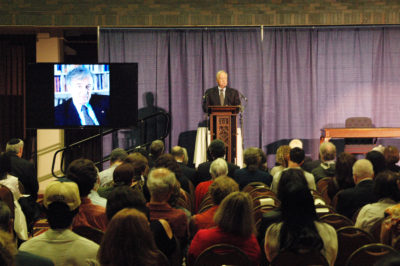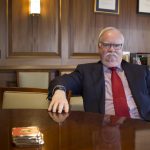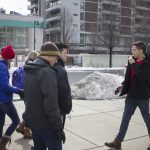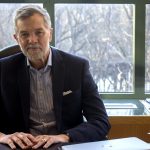
The Elie Wiesel Center for Jewish Studies and the Boston University Alumni Association hosted a series of panel discussions and presentations on Sunday to celebrate the life and legacy of the late writer, activist and BU professor Elie Wiesel.
The goal for the day of celebration was to reinforce and remind people of the outstanding contributions that Wiesel made not only to the university but to society as a whole, according to professor Michael Zank, the director of the Elie Wiesel Center for Jewish Studies.
“We hope alumni, students, and members of the Boston public will be reminded of the extraordinary personality of Elie Wiesel, who taught at Boston University for nearly 40 years,” Zank wrote in an email, “and [that they will] be assured that the university takes Elie Wiesel’s legacy very seriously, as a Jewish writer and thinker and a voice of conscience on behalf of persecuted minorities everywhere.”
The day of celebration commenced with a set of three distinct panel discussions in the Questrom School of Business auditorium. The panels featured former students of Wiesel, as well as writers, teachers and activists.
The first of the three panels focused on how Wiesel affected life in the classroom. Rabbi Nehemia Polen, a professor at Hebrew College and a former student of Wiesel, said Wiesel taught him the power of storytelling in the classroom.
“When we share each other’s stories,” Polen said during the discussion, “one of the messages that I heard, and I think we all heard, in [Wiesel’s] classroom, is that our lives are incomplete until someone else returns to us from their experience a piece of our story.”
The second discussion was centered on the ways in which Wiesel’s work affected theological thinking and dialogue after the Holocaust. Speakers discussed how Wiesel’s essays and books portrayed religion and human nature.
The final panel discussion concerned how Wiesel’s life’s work touched people on a personal and emotional level.
The discussions in the morning were followed by a celebration in the afternoon that featured speeches and musical performances. Among the speakers were Wiesel’s son, Elisha Wiesel, BU professors and BU President Robert Brown — who encouraged students to discover the portion of Wiesel’s work that remains on campus.
“A tangible, enduring part of [Wiesel’s] legacy is here in the form of the papers kept at the Howard Gotlieb Archival Research Center, and perhaps most importantly, the recordings, which are easily accessible, of his lectures,” Brown said. “At universities, we create new knowledge — sometimes wonderful life-saving and life-changing inventions. We also preserve and protect the knowledge of the past, and lives are saved and enriched if we keep the lessons of the past.”
Wiesel’s legacy was the focal point of the day’s presentations and performances. It is a legacy that speaks to the great qualities of human nature, according to Rabbi Polen.
“[Wiesel] showed that in the end, humanity will triumph – that hope triumphs over despair,” Polen said after the panel discussions. “We can and we must and we will rise up from the ashes and bring new hope and the possibility of dignity and a vision of nobility to humanity. That’s his legacy.”
Several of the people who participated in the day of celebration said they admired Wiesel’s life’s work and that they enjoyed hearing the perspectives of others who revered him.
Sarah Dasher, a first-year graduate student in the College of Communication, said she enjoyed the panel discussions, especially Polen’s remarks.
“Today was much more profound than I anticipated,” Dasher said. “[I enjoyed] on the first panel, the gentleman who talked about how we really don’t know ourselves until we see ourselves reflected back through the words of another. I’m definitely going to take that away from today, but that’s just one of many things.”
Tanner Smoot, 26, from Charleston, West Virginia, said he had read Wiesel’s most famous book, “Night,” in high school and wanted to learn more about his legacy by going to see the presentations.
“[This] was just an interesting opportunity to learn more about how he impacted the area and interacted with the students,” Smoot said. “It was enjoyable because it talked about his personal impact with students and faculty.”
Sharon Heim, 59, from Brighton, said she went to nearly all of Wiesel’s lectures at BU for 30 years, even though she never attended BU. Being the daughter of Holocaust survivors, Heim felt that she wanted to pay respect to Wiesel’s legacy.
“I loved his lectures every year,” Heim said. “He gave a series of three lectures every year. One was on the Biblical character, one was on the Talmud, and the third one was Hasidic, or some years it was about the Holocaust. He was just a great midrashist. I just felt it was important to come.”




